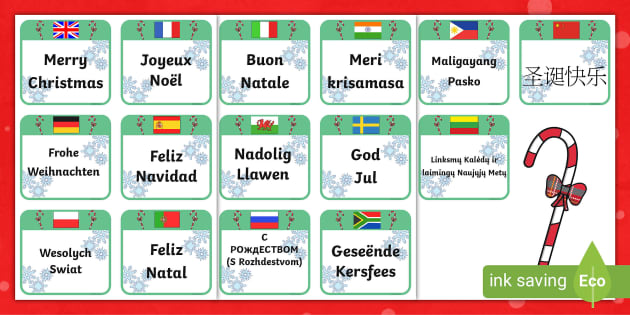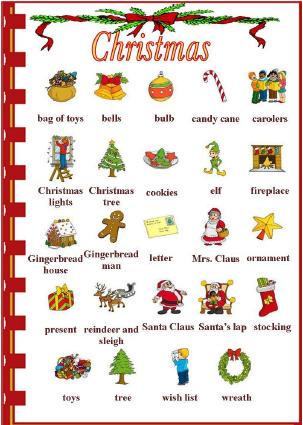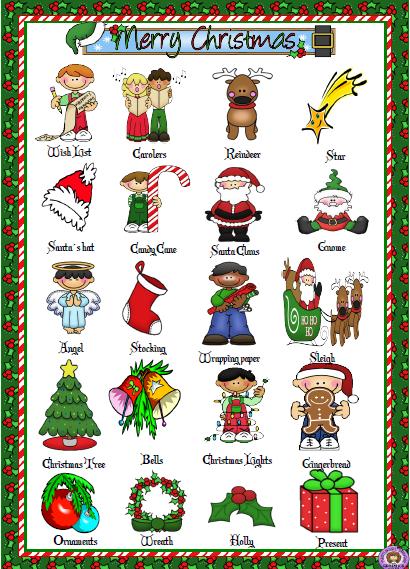A Lexicon Of Christmas: Exploring The Language Of The Festive Season
A Lexicon of Christmas: Exploring the Language of the Festive Season
Related Articles: A Lexicon of Christmas: Exploring the Language of the Festive Season
Introduction
With great pleasure, we will explore the intriguing topic related to A Lexicon of Christmas: Exploring the Language of the Festive Season. Let’s weave interesting information and offer fresh perspectives to the readers.
Table of Content
A Lexicon of Christmas: Exploring the Language of the Festive Season

Christmas, a celebration observed globally, is steeped in rich traditions and customs. A significant aspect of this cultural phenomenon is the language associated with it. This article delves into the lexicon of Christmas, exploring the words that shape our understanding of the holiday and its significance.
A Tapestry of Words: From Origins to Modern Usage
The vocabulary of Christmas is a fascinating blend of ancient, religious, and secular influences. Words like "Christmas" itself, derived from the Middle English "Cristes Masse," trace back to the celebration of the birth of Jesus Christ. This religious origin is reflected in terms like "Nativity," "Advent," and "Epiphany," all deeply rooted in Christian tradition.
However, the language of Christmas extends beyond religious connotations. Words like "Santa Claus," "reindeer," and "snowman" reflect the secular and cultural aspects of the holiday. "Santa Claus," derived from the Dutch "Sinterklaas," symbolizes the spirit of generosity and gift-giving, while "reindeer" and "snowman" evoke imagery of winter landscapes and festive traditions.
Words of Festivity and Merriment
Christmas is synonymous with joy, celebration, and togetherness. Words like "carols," "feast," "decorations," and "gifts" capture the essence of this festive spirit. "Carols," traditional songs sung during Christmas, embody the joy and celebration of the season. "Feast," referring to the lavish meals enjoyed during Christmas, highlights the importance of shared meals and togetherness. "Decorations," from twinkling lights to festive ornaments, transform homes and public spaces into a visual celebration of the holiday. "Gifts," a symbol of love and generosity, are exchanged to express affection and strengthen bonds during this special time.
Beyond the Surface: Exploring Nuances in Christmas Vocabulary
The language of Christmas is not merely a list of words but a complex tapestry woven with cultural, historical, and personal significance. Words like "homecoming," "tradition," and "nostalgia" evoke deeper emotions associated with the holiday. "Homecoming," referring to the return of family members for Christmas, highlights the importance of family and togetherness. "Tradition," representing the customs and rituals passed down through generations, underscores the enduring nature of Christmas traditions. "Nostalgia," a sense of longing for past Christmases, reflects the sentimental value attached to the holiday.
FAQs about Christmas Words
Q: Where does the word "Christmas" originate from?
A: The word "Christmas" is derived from the Middle English "Cristes Masse," meaning "Christ’s Mass." It signifies the celebration of the birth of Jesus Christ.
Q: What is the origin of the word "Santa Claus"?
A: "Santa Claus" is derived from the Dutch "Sinterklaas," a figure associated with gift-giving during the Christmas season.
Q: What is the meaning of the word "Advent"?
A: "Advent" refers to the period of four weeks leading up to Christmas, during which Christians prepare for the birth of Jesus Christ.
Q: What is the significance of the word "Epiphany"?
A: "Epiphany" marks the twelfth day of Christmas, celebrating the revelation of Jesus Christ to the Gentiles.
Tips for Using Christmas Words
- Contextualize: Use Christmas words appropriately to reflect the specific context and meaning.
- Avoid Clichés: While familiar Christmas phrases can be comforting, strive for fresh and creative language.
- Consider Tone: The choice of words should reflect the intended tone, whether festive, sentimental, or humorous.
- Respect Cultural Differences: Be mindful of the diverse cultural interpretations of Christmas and use language that is inclusive and respectful.
Conclusion
The language of Christmas is a rich tapestry woven with history, tradition, and cultural significance. From ancient religious terms to modern secular expressions, the words we use to describe Christmas reflect the multifaceted nature of the holiday. By understanding the origins and meanings of these words, we gain a deeper appreciation for the cultural and personal significance of Christmas. As we celebrate the season, let us continue to enrich the lexicon of Christmas with new expressions that capture the evolving spirit of this beloved holiday.








Closure
Thus, we hope this article has provided valuable insights into A Lexicon of Christmas: Exploring the Language of the Festive Season. We hope you find this article informative and beneficial. See you in our next article!
Leave a Reply